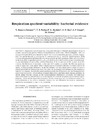Please use this identifier to cite or link to this item:
https://accedacris.ulpgc.es/jspui/handle/10553/47378
| Title: | Respiration quotient variability: Bacterial evidence | Authors: | Romero-Kutzner, V. Packard, T. T. Berdalet, E. Roy, S. O. Gagné, J. P. Gómez, May |
UNESCO Clasification: | 251001 Oceanografía biológica | Keywords: | O2 consumption CO2 production Isocitrate dehydrogenase IDH Electron transport system (ETS), et al |
Issue Date: | 2015 | Project: | Metabolismo planctónico: Regulación Bioquímica e Impacto Oceanográfico sobre la Bomba Biológica | Journal: | Marine Ecology - Progress Series | Abstract: | Respiratory metabolism was compared between 2 different physiological states of acetate- and pyruvate-grown cultures of Pseudomonas nautica and Vibrio natriegens. Here, we analyze 35 h and 520 h experiments in which time-courses of protein, pyruvate, acetate, respiratory CO2 production (RCO2), respiratory O2 consumption (RO2), isocitrate dehydrogenase (IDH) activity, and potential respiration (Φ) were measured. Respiratory quotients (RQs) were calculated as the ratio of the respiration rates (RCO2/RO2). Such RQs are widely used in ocean ecosystem models, in calculations of carbon flux, and in evaluations of the ocean’s metabolic balance. In all the cultures, the RQ tended to increase. In the case of P. nautica on acetate, the RQ rose nearly an order of magnitude from values below 1 during carbon-substrate sufficiency to values close to 10 during carbon-substrate deficiency. In all the cultures, the respiration rates during the growth period paralleled the biomass increase, but after the substrates were exhausted, the respiration rates fell. In contrast, through this same transition period, the IDH activity and the Φ remained relatively high for the first 10 h of carbon-substrate deprivation, and then, these enzyme activities fell slowly, along with the biomass, as the carbon-substrate deprivation continued. The nutritional state of the bacteria affected the RQ, rendering the RQ variable for physiological and ecological purposes. These results argue that ecosystem models, oceanographic calculations of carbon flux, and evaluations of the ocean’s metabolic balance that are influenced by bacterial metabolism need to be reconsidered in light of RQ variability. | URI: | https://accedacris.ulpgc.es/handle/10553/47378 | ISSN: | 0171-8630 | DOI: | 10.3354/meps11062 | Source: | Marine Ecology Progress Series [ISSN 0171-8630], v. 519, p. 47-59 |
| Appears in Collections: | Artículos |
SCOPUSTM
Citations
22
checked on Jun 8, 2025
WEB OF SCIENCETM
Citations
25
checked on Jan 25, 2026
Page view(s)
124
checked on Aug 24, 2024
Download(s)
184
checked on Aug 24, 2024
Google ScholarTM
Check
Altmetric
Share
Export metadata
Items in accedaCRIS are protected by copyright, with all rights reserved, unless otherwise indicated.
